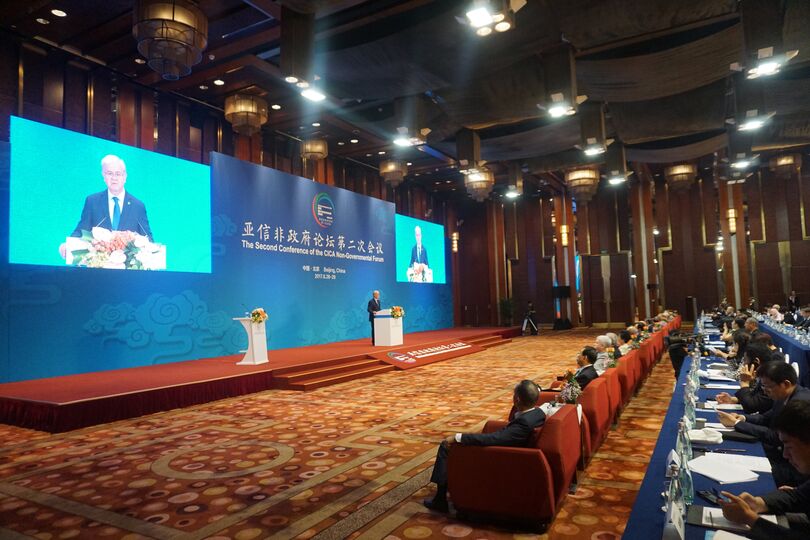On 28 June 2017, the second annual non-governmental forum, Conference on Interaction and Confidence-Building Measures in Asia (CICA), titled "25 years of CICA: For Asian Security and Development," opened in Beijing. An SCO Secretariat delegation headed by SCO Secretary-General Rashid Alimov is taking part in the conference.
During the opening ceremony, Chen Yuan, Deputy Chairman of the Chinese People's Political Consultative Conference, read a message from PRC President Xi Jinping on the 25th anniversary of establishing the CICA. He also made a separate report as one of the main speakers.
Other main speakers at the opening ceremony included SCO Secretary-General Rashid Alimov.
Mr Alimov warmly congratulated the CICA member-countries on the 25th anniversary of the organisation and expressed hope that the CICA would continue to make a special contribution to strengthening confidence-building measures in Asia through the joint efforts of its member states, and that it would facilitate the well-being and prosperity of regional nations.
Mr Alimov emphasised that the "Asian nations are inextricably bound by a rich common history with intertwined and unique cultures and traditions. The wisdom of the Asian nations and the fact that the knowledge that the road to peace and prosperity lies in building a safe and stable environment on a vast territory between three oceans, and this can only be accomplished through joint efforts." In this context, he praised the CICA's role as an effective venue for wide-ranging and open-minded exchange of opinion on approaches towards strengthening practical cooperation in the name of peace, security and stability, mutual understanding and achieving pan-Asian consensus on the key issues of today.
Mr Alimov noted that "the CICA and the SCO are partner organisations with a common spirit; they address similar tasks of general security and strive to achieve common goals, including efforts to create favourable conditions for sustainable joint development." The world system retains the potential for generating conflict, and its political and economic mechanisms still have certain disproportions. Therefore, both associations assume special responsibility for searching for well-balanced responses to the challenges facing the Asian region that accounts for over 50 percent of the world's population.
"Acute contemporary problems, including international terrorism, illegal drug trafficking, trans-border crime, poverty and unemployment have assumed a tremendous scale and remain our common concern," Mr Alimov added. The decisions of the SCO Astana summit aim to find efficient ways to counter these threats.
"First of all, the modern world needs to create a polycentric world-order model that can meet the interests of each and every state. In this connection, the SCO is determined to facilitate the process of democratising international relations, creating an effective global and regional security and cooperation system and forging a human community with a common destiny," Mr Alimov said.
"The organisation is confident that there is no alternative to resolving conflict situations by political-diplomatic methods based on unfailingly honouring generally recognised norms and principles of international law, as well as the goals and principles of the UN Charter. It continues to call for strengthening the UN's central coordinating role in international relations," Mr Alimov commented.
While discussing approaches towards addressing the extremely complicated task of combating global terrorism, Mr Alimov said that it was still necessary to pool the efforts of the entire global community for addressing this issue. He underscored the fact that a statement by SCO member states to jointly combat international terrorism adopted in Astana calls for establishing a wide-ranging international anti-terrorist coalition.
Mr Alimov drew forum participants' attention to issues of the world economy and international economic relations. He said that the persisting turbulence of the world economy is a major challenge to modern development. In his opinion, this calls for broad international cooperation to encourage global economic rehabilitation, establish economic and financial stability and secure sustainable, dynamic, well-balanced and all-inclusive growth in conditions of promoting the process of economic globalisation. In this connection, Mr Alimov noted the importance of consistently expanding world trade based on the principles of transparency and non-discrimination, as well as on the basis of common regulations for all participants.
"The SCO will consistently build a system of trade and economic cooperation for creating favourable conditions to gradually facilitate the free movement of goods, capital, services and technologies. In this context, the implementation of innovative national strategies for the development of the SCO member states, combined with the initiative of PRC President Xi Jinping to formulate the Belt and Road initiative, integration processes within the Eurasian Economic Union and forging a major Eurasian partnership with the involvement of the ASEAN countries, opens many prospects for broad regional economic growth," Mr Alimov stressed.
The community of Asian nations is determined by common moral and cultural priorities, and the history that links them has common assets and roots. In this connection, the SCO Secretary-General expressed the importance of expanding inter-cultural and inter-civilisational dialogue and promoting the values and foundations of the Asian nations' cultural wealth. He assured forum participants that "the SCO will continue working to expand cultural cooperation, and preserve and encourage the diversity of cultures."
Conference delegates also heard reports on the state and prospects of expanded pan-Asian cooperation by former PRC Foreign Minister Li Zhaoxing, Honorary President of Chinese People's Institute of Foreign Affairs, Ambassador of Russia to the PRC Andrei Denisov, Ambassador of Kazakhstan to the PRC Shakhrat Nuryshev and Executive Director of the CICA Secretariat Gong Jianwei.
The non-governmental forum Conference on Interaction and Confidence-Building Measures in Asia (CICA) was established on the initiative of PRC President Xi Jinping at the 4th CICA summit in May 2014 in Shanghai.
The second annual non-governmental forum Conference on Interaction and Confidence-Building Measures in Asia (CICA), due to end on 29 June 2017, involves about 300 heads and representatives of leading research centres and non-governmental organisations, prominent politicians and diplomats from 36 countries. Over 80 media representatives of Chinese and foreign media outlets are covering the event.
